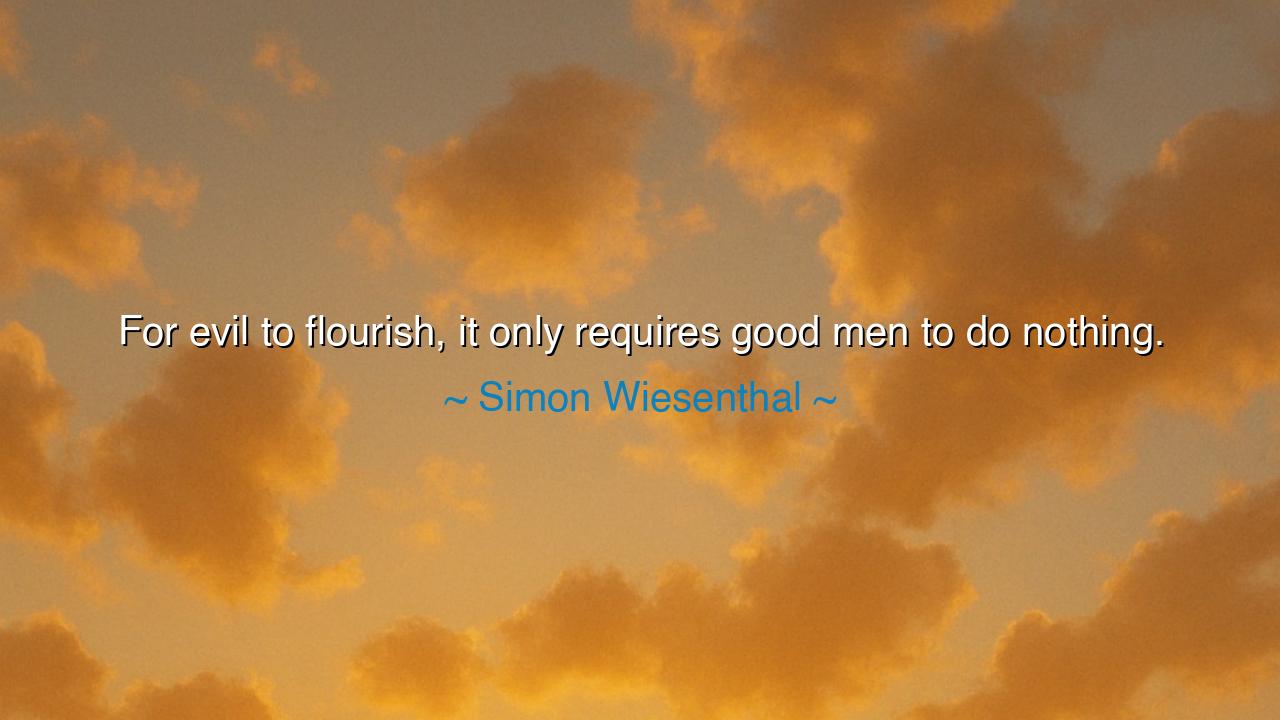
For evil to flourish, it only requires good men to do nothing.






"For evil to flourish, it only requires good men to do nothing." — these words, spoken by Simon Wiesenthal, are a sobering reminder that the forces of evil do not always rise through power or violence alone, but often with the silent complacency of those who choose not to act. Wiesenthal, a Holocaust survivor and relentless pursuer of justice, understood deeply that evil can grow when it is allowed to spread unchecked, when good men fail to take a stand. His words echo through history, a call to action and a warning that even the most noble intentions can be rendered meaningless if they are not acted upon in the face of wrongdoing.
In the ancient world, the question of what constitutes virtue and how we respond to injustice was ever-present. The Greek philosophers debated the nature of goodness, justice, and courage in their writings. Socrates, perhaps the most famous of them all, famously proclaimed that an unexamined life was not worth living, implying that moral action and reflection were at the heart of true human flourishing. However, the great heroes of Greek mythology—Hercules, Achilles, and others—often embodied the struggle against evil through direct action. It was not enough for these figures to stand by; they had to confront monsters, tyrants, and the forces of chaos. In this sense, the ancient world teaches that evil thrives not only in the absence of courage but in the failure of good men to engage with it when it threatens the order of the world.
The most tragic example of this truth in modern history is the rise of Nazi Germany. The Holocaust, in which millions of Jews and others were systematically murdered, did not occur overnight. It was a gradual process, a moral erosion that began when the world stood silent in the face of injustice. It was not just the actions of Hitler and the Nazis that allowed the Holocaust to unfold, but the indifference or outright complicity of countless individuals and nations who chose not to act. Many turned a blind eye to the growing atrocities, believing that inaction would spare them the turmoil of standing up against the monstrous evil unfolding before them. Wiesenthal, who survived the horrors of these times, knew from his own experience that when good people do nothing, evil flourishes unchecked, leaving countless lives lost and a world marked by indifference.
In ancient Rome, we see a similar failure to act in the story of Julius Caesar’s rise to power. Although many senators, good men who cherished the ideals of the Roman Republic, saw the erosion of their freedom under Caesar’s dictatorship, they hesitated to take action until it was too late. Their failure to unite against Caesar allowed him to seize total power. Even though Brutus, a close confidant of Caesar, knew the dangers of tyranny, he failed to recognize the urgency of the moment until he, along with other senators, took drastic action. But even then, the damage was done. The failure of good men to act decisively earlier in the political crisis led to the fall of the Republic and the rise of imperial rule. The lesson of this ancient story resonates with Wiesenthal’s warning: when good men fail to rise against evil, it has a way of taking root and shaping the world around them.
The lesson here is not one of guilt, but of responsibility. Wiesenthal reminds us that we, as individuals, bear the burden of moral action. To remain silent in the face of evil is to allow it to thrive; to turn away from injustice is to enable it. History teaches us that those who have changed the course of events—from Gandhi to Martin Luther King Jr., to Nelson Mandela—were not men who waited for change to come to them. They were action-takers, men who stood up and confronted evil with courage, even in the face of overwhelming opposition. They embodied the belief that good men must act, or evil will fill the vacuum left by inaction.
In our own lives, the question remains: will we be those who act, or those who stand by? Whether in our communities, our workplaces, or our personal lives, the principle remains: to do nothing in the face of wrongdoing is to give that wrongdoing the power to flourish. We may not face the monsters of myth or the tyrants of history, but we are still called to confront the evils that arise in the small, quiet corners of life. Whether it is bullying, discrimination, injustice, or corruption, we must recognize that silence in the face of such things is tantamount to enabling them. The power of good men lies not just in their virtue but in their willingness to act.
Thus, we must strive to be those who stand up against evil—in our own lives and in the world. Let us not wait for someone else to take the lead or for the right moment to come. Like the great heroes of ancient myth, we must face the monsters of our time with courage, determination, and integrity. Wiesenthal’s words remind us that our inaction is as much a part of the problem as the evil itself. Let us choose to act with conviction, to speak up when we see wrongdoing, and to confront injustice where it exists, knowing that the world we shape depends on the decisions we make in these moments.






AAdministratorAdministrator
Welcome, honored guests. Please leave a comment, we will respond soon